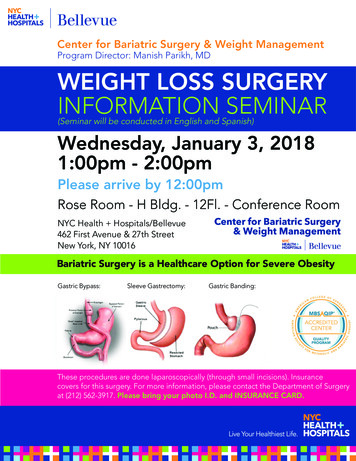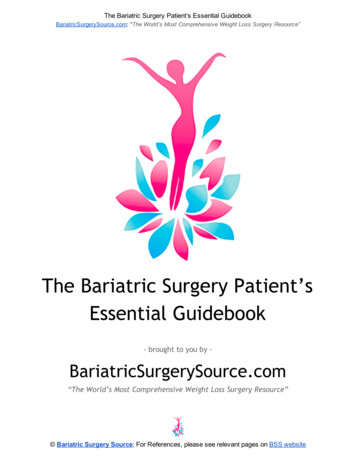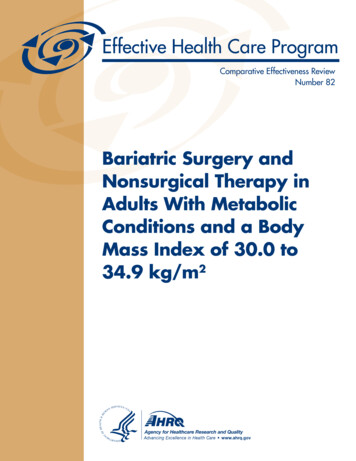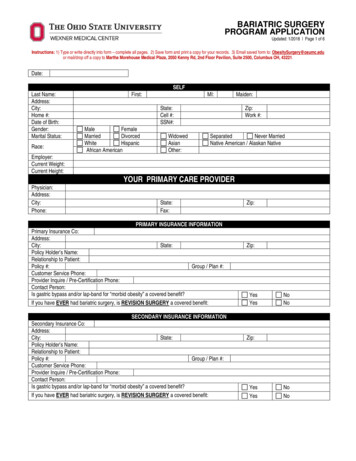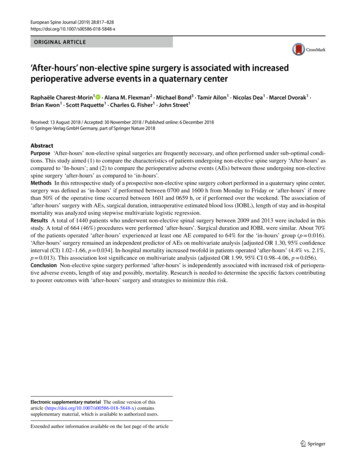
Transcription
Life after Bariatric Surgery
Table of ContentsWelcome . 4Patient Responsibilities . 4Goals for Long Term Success . 5Treatment Options and Keys to Success Roux-en-Y Gastric Bypass . 7 Sleeve Gastrectomy . 9Recommended Weight Loss before Bariatric Surgery . 11Carbohydrates, Sugars and FluidsCarbohydrates after Bariatric Surgery . 13Dumping Syndrome . 15Drinking Fluids after Bariatric Surgery . 17Supplements after SurgeryVitamins, Minerals & Supplements: Gastric Bypass & Sleeve Gastrectomy 19Protein Supplements after Bariatric Surgery . 20Nutrient Loss: Gastric Bypass and Sleeve Gastrectomy . 21Talk to your doctor or health care team if you have any questions about your care.For more health information, go to wexnermedical.osu.edu/patiented or contact the Library for Health Information at614-293-3707 or health-info@osu.edu. 2006 - June 17, 2021, The Ohio State University Wexner Medical Center.
Bariatric Surgery DietBariatric Surgery: Diet Overview . 23Bariatric Surgery: Step 1 Diet . 24Bariatric Surgery: Step 2 Diet . 25Bariatric Surgery: Step 3 Diet . 29Bariatric Surgery: Step 4 Diet . 34Characteristics of Successful Weight Maintenance . 38Avoiding Weight Gain after SurgeryLower Fat Food and Cooking Choices . 39Tips for Lowering Cholesterol and Fat in Your Diet . 41Lean Dining Tips . 44Getting Facts on Fast Food . 49Please note:In this book, the term “Bariatric Surgery” covers care for all treatment options, includinggastric bypass and sleeve gastrectomy.If you would like a digital copy of this book, please visit go.osu.edu/pted3689.wexnermedical.osu.eduLife after Bariatric Surgery3
WelcomeWelcome to your Life afterBariatric Surgery class!You have traveled a longroad to reach this point, butyou have made it. Surgeryhelps you lose weight andimprove your quality of life,but lifestyle changes areneeded for lasting results.During these classes, wewill talk about the lifestylechanges needed to makesurgery a success, such as: Vitamin and mineral supplements How to eat the first weeks after surgery Exercise What to expect in the hospitalYour support person is encouraged to attend these classeswith you. It is important that they understand the changesyou will go through to best support you.We expect you to be an active participant in this process.You will have goals to work on outside of class. We willreview your progress and give feedback to help you reachyour goals. The assignments will help you gain betterunderstanding of what life will be like after surgery.It cannot be said enough that long-term success dependson your level of commitment.“If you always do what you’ve always done, you willalways get what you’ve always got.”We will give you the most current recommendations to helpyou succeed. It is our pleasure to guide you through thecoming months and onto a healthier life.To your good health!4Life after Bariatric SurgeryPatientresponsibilitiesI understand that It is myresponsibility to: Read the information inthis book. Attend all classes. If Imiss a class, I need toschedule a make upclass, and I may have topay an additional cost. Arrive on time to class.If I am more than 15minutes late, I will haveto attend a make upclass. Purchase vitamin,mineral and proteinsupplements before mysurgery and as neededafter surgery. Attend follow upappointments to checkmy nutritional status.I understand that notfollowing the guidelines inthis book may cause: Vomiting Blockage of the pouch Weight gain Poor healing. Staple line damage ofthe pouch Readmission to thehospital Re-operation Malnutritionwexnermedical.osu.edu
Goals for Long Term SuccessNone of the weight loss surgeries will cure obesity. You will lose weight atfirst, but at some point, your success will depend on your lifestyle choices.Goals to accomplish before surgery Eat 5 to 6 small meals or snacks per day. Eat slowly. Rest about one minute between bites, using this time to cut food into smallerpieces or to set your utensils down. Avoid distracted eating environments, such as eating infront of the TV. Limit sugars, sweets, desserts and sugared beverages to prevent dumping syndrome andweight gain. Limit sugars to no more than 10 grams per meal. Drink at least eight, 8-ounce cups (64 ounces total) of water a day. Sip liquids and practice eating meals without beverages. Stop 10 minutes before eating andwait at least 30 minutes after eating before you resume drinking. Wean off of caffeine, carbonated beverages and alcohol. Drink more sugar-free beverages,such as water. Take a complete multivitamin and mineral supplement daily to promote long term health. Understand the importance of protein and protein sources for the post-op diet. Choose lean protein sources like meat, dairy, beans and nuts/seeds. Eat less fried foods, added fats and processed food items. Emphasize at-home meal planning and packing. Limit dining out to 1 or 2 times a week.wexnermedical.osu.eduLife after Bariatric Surgery5
Behaviors for long-term success Maintain a tracking system of daily food intake, such a food log or a mobile device app.Consider tracking all food, all fluids, time eaten, portion sizes, estimated calories, grams ofprotein and physical activity. Exercise regularly, including both aerobic exercise and strength training. Plan ahead for balanced meals, including lean proteins, fruits and vegetables Surround yourself with positive social and behavioral support. Get enough sleep. Aim for at least 6 to 8 hours per night. Weigh yourself weekly to track your progress.Behaviors that are red flags for failure Starting to eat sweets. Eating fast foods often. Skipping meals. Eating after your stomach is full. Eating rapidly. Grazing mindlessly. Eating when bored, upset, angry or depressed. Clinging to the couch and not exercising. Choosing favorite carbs first. Snacking from vending machines. Eating and drinking at the same time.6Life after Bariatric Surgerywexnermedical.osu.edu
Roux-en-Y Gastric BypassRoux-en-Y gastric bypasshelps you lose weight in twoways. It reduces the size ofyour stomach and decreasesnutrient absorption.A normal stomach is aboutthe size of a football. It canhold from 1 to 2 quarts. Aftersurgery, your new pouch willbe about the size of an egg. Itcan hold ¼ to ½ cup. A smallamount of food will make youfeel full.EsophagusPouchStomachIntestineAbsorptive area after surgeryis reduced by at least ⅓ of theoriginal area. Certain nutrientsare not easily absorbed in theamounts your body needs.You will need to take vitaminand mineral supplements asdirected by clinic staff.Weight lossYou can expect a realistic weight loss of 50 to 80% of excess weight by 2 years after surgery.For example: A person who weighs 300 pounds and whose ideal body weight is 150 pounds(150 pounds of excess body weight) would have a successful weight loss at 2 years of 75 to 120pounds. This person would then weigh 180 to 225 pounds. 300 pounds (current weight) - 150 pounds (ideal body weight) 150 pounds (excess weight) 300 pounds - (50% x 150 pounds) 300 pounds - 75 pounds 225 pounds 300 pounds - (80% x 150 pounds) 300 pounds - 120 pounds 180 poundsIdeal body weight is equal to 100 pounds for the first 5 feet plus 5 pounds for each added inch forwomen. For men, it is equal to 106 pounds for the first 5 feet plus 6 pounds for each added inch.wexnermedical.osu.eduLife after Bariatric Surgery7
Your expected weight lossTake your current weight in pounds and subtract your ideal weight to find the amount of yourexcess weight. current weightideal body weightexcess weightTo find your range of weight loss over 2 years, find 50% and 80% of your excessweight.x0.5 excess weight50% of excessweightx0.8 excess weightExpected rangeof weight loss by2 years880% of excessweight Life after Bariatric Surgery50% of excessweighttopounds80% of excessweightwexnermedical.osu.edu
Sleeve GastrectomySleeve gastrectomy, alsocalled vertical sleeveor laparoscopic sleevegastrectomy, helps you loseweight by removing a largepart of your stomach. Yourstomach is smaller, so youfeel full sooner and eat less.EsophagusStomach(sleeve portion)Stomach(removed portion)A normal stomach is aboutthe size of a football. It canhold 1 to 2 quarts of food andfluid at a time. After surgery,your new stomach will beless than half of its normalsize and be the shape of abanana. It will be able to hold1 to 1¼ cups of food 12 to 18months after surgery. Mealsize is often limited to ¼ to ½cup during the first 18 monthsafter surgery.IntestineAfter surgery, stomach acid may be reduced.This makes it harder for some nutrients to beabsorbed into the body. You will need to takevitamin and mineral supplements as directed byclinic staff.Weight lossYou can expect a realistic weight loss of 50 to 70% of excess weight by 2 years after surgery.For example: A person who weighs 300 pounds and whose ideal body weight is 150 pounds(150 pounds of excess body weight) would have a successful weight loss at 2 years of 75 to 105pounds. This person would then weigh 195 to 225 pounds. 300 pounds (current weight) - 150 pounds (ideal body weight) 150 pounds (excess weight) 300 pounds - (50% x 150 pounds) 300 pounds - 75 pounds 225 pounds 300 pounds - (70% x 150 pounds) 300 pounds - 105 pounds 195 poundsIdeal body weight is equal to 100 pounds for the first 5 feet plus 5 pounds for each added inch forwomen. For men, it is equal to 106 pounds for the first 5 feet plus 6 pounds for each added inch.wexnermedical.osu.eduLife after Bariatric Surgery9
Your expected weight lossTake your current weight in pounds and subtract your ideal weight to find the amount of yourexcess weight. current weightideal body weightexcess weightTo find your range of weight loss over 2 years, find 50% and 70% of your excessweight.x0.5 excess weight50% of excessweightx0.7 excess weightExpected rangeof weight loss by2 years1070% of excessweight Life after Bariatric Surgery50% of excessweighttopounds70% of excessweightwexnermedical.osu.edu
Recommended Weight LossBefore SurgeryWe understand that our patients have come to us for surgery becausethey have had a hard time losing weight, and they need help.Bariatric surgery is a tool, and we think it is a very powerful tool, forlosing a large amount of weight. However, we believe that losing weightbefore surgery will help you be safer and more ready for your surgeryand your weight loss journey. Our surgeons may delay or cancel surgeryfor patients who do not lose weight or who gain weight before surgery.Patients who lose weight before surgery have fewer problemsduring and after surgery.This is especially true for larger patients who have a BMI of 60 or more. Weight loss makes the liver smaller. The stomach is behind part of the liver. The liver has to bemoved aside during the surgery for the surgeon to work. Smaller patients are less likely to have problems like blood clots after surgery. Making changes to eating and exercise habits while you get ready for surgery makes continuing these changes after surgery easier.Our surgeons recommend losing 5 to 10% of your weight before surgery. At your first appointmentwith the dietitian, you will discuss your weight loss goals. For most patients, the goal is to eat500 to 1000 calories less per day. This is done by changing your diet and adding more exercise.These changes will help you lose 1 to 2 pounds per week.Our staff is here to help you. If you want or need more help with losing weight, let us know! Staff will check with you at the half-way point of the program to see how you are doing withweight loss. If you are having trouble at the halfway point, we can give you more help, such as meetingwith a dietitian or nurse practitioner for more advice and possibly using medicine to help withweight loss.wexnermedical.osu.eduLife after Bariatric Surgery11
To continue weight loss before surgery, you may be placed on aliver shrink diet. You will meet with your surgeon and dietitian. They will give you detailed instructions for theliver shrink diet. The diet usually lasts for 2 to 4 weeks before surgery. The diet is low in calories and low in carbohydrates. It uses shakes to replace some of your meals. They are low in calories and high in protein. There are different levels to the diet specific to your weight and health needs. Your level isdetermined by your surgeon and dietitian. If you have diabetes, you may need to lower your diabetes medicines while on this diet toavoid hypoglycemia (low blood sugar). Talk to your health care provider regarding changes toyour medicines.12Life after Bariatric Surgerywexnermedical.osu.edu
Carbohydrates after Bariatric SurgeryYour body uses carbohydrates for energy. The threemain types of carbohydrates in foods are starch,sugar and fiber. Your body needs all three typesto function well. A product’s total carbohydrate,dietary fiber and sugars are listed on Nutrition Factsfood labels. You will need to read food labels afterbariatric surgery to know how many carbohydratesare in a serving of food.Carbohydrates are simple or complex: Simple carbohydrates, also called simplesugars, are sugars that can be easily digested,so they are a quick source of energy. Some, likefruit and milk, are healthy. Others, that includeprocessed or refined sugars, are not.Complex carbohydrates, also called dietarystarch, are foods that are rich in vitamins,minerals, antioxidants and fiber. Complexcarbohydrates take longer to digest and thus aremore filling.Most carbohydrates eaten should be complexinstead of simple.Nutrition Facts6 servings per containerServing sizeAmount per servingCalories1 cup (140g)170% Daily Value*Total Fat 8g10%Saturated Fat 3g15%Trans Fat 0gCholesterol 0mg0%Sodium 5mg0%Total Carbohydate 22g8%Dietary Fiber 2g7%Total Sugars 16gIncludes 8g Added Sugars16%Protein 2gVitamin D 0mcg0%Calcium 20mg2%Iron 1mg6%Potassium 240mg6%*The % Daily Value tells you how much a nutient in a servingof food contributes to a daily diet 2000 calories a day is usedfor general nutrition advice.Complex carbohydrates sourcesComplex carbohydrates are often found in whole plant foods. Whole grain or whole wheat breads Whole grain cereals, like oatmeal Whole grain or whole wheat pasta Brown rice Quinoa Beans, lentils and peas Potatoes Vegetableswexnermedical.osu.eduLife after Bariatric Surgery13
Simple carbohydrates sourcesSimple carbohydrates, like fruit and low fat milk (fat free skim and 1%), are healthy for you.They have vitamins and minerals your body needs.Other simple carbohydrates need to be avoided. As they are quickly digested, they can lead todumping syndrome in patients who have had gastric bypass. Simple carbohydrates also lead toweight gain.Avoid these foods most of the time: Baked goods, such as cakes, cookies, muffins, doughnuts or pies. They are made with whiteflour and not whole wheat flour, like complex carbohydrates. Dairy-based goods, such as ice cream, pudding, frozen yogurt, fudgsicles, chocolate milk, hotchocolate and regular yogurt Fruit juices, drinks or products, such as orange juice, fruit punch, lemonade, Kool-Aid, frozenjuice bar, gelatin, popsicles, pop tarts or fruit bars White rice Sweetened cereals Granola. Some products are high in sugar, so check the nutrition label before buying. Sweetened tea Regular soft drinks Sugar products, with molasses, corn syrup, table sugar, syrup or honey Jam and jelly Sweetened cereals Candy14Life after Bariatric Surgerywexnermedical.osu.edu
Dumping SyndromeAbout dumping syndromeDumping syndrome is most often experienced by people who have had gastric bypass or sleevegastrectomy surgery. After surgery, the size of your stomach is much smaller. This effects howyour stomach regulates the amount of food moving to the intestines for digestion. Your stomachpouch can not hold as much food and fluids as you ate before surgery. When you eat a regularsize meal now, the food in the stomach may be “dumped” too quickly into the bowels. Also, whensugars that you have eaten are dumped into the bowels, they may act like sponges. They rapidlyabsorb water from the body in the intestines.Signs of dumping syndromeThere are two types of dumping syndrome: early dumping and late dumping. Early dumping: Happens 10 to 30 minutes after a meal. A person may have nausea, bloating,cramping or diarrhea. Late dumping: Happens 1 to 3 hours after a meal. A person may feel weak or dizzy, sweat andmay want to lie down. Lying down for 30 to 60 minutes may help with these signs. If it doesnot, call your health care provider.How to prevent dumping syndromeYou can help to prevent dumping if you: Avoid sugar and sweets. Eat small meals more often. Avoid drinking while eating.1. Avoid sugar and sweets.After surgery, sugar and sweets tend to enter the bowel too quickly. This can cause crampsand diarrhea. Read food labels. Limit meals to 10 grams of sugar. This is equal to 2½ teaspoons of sugar. Choose products that are labeled sugar free. Sugar free products have less than 5grams of sugar per serving. Look for sugar free versions of foods high in sugar, includingbarbecue sauce, cereals, frozen yogurt, fruit flavored yogurt, fruit juice, granola, jam,gelatin, Kool-Aid, soft drinks, syrup and desserts. Sugar substitutes may be used in moderation, such as Splenda, Sweet‘N Low, Equal,Stevia and Sweet One instead of sugar. Avoid sugar alcohols, such as sorbitol, malitol, xylitol, mannitol, erythritol, isomalt andlactitol. They may lead to dumping syndrome.wexnermedical.osu.eduLife after Bariatric Surgery15
Avoid products with sugar as a main ingredient. If one of the first 3 ingredients on thelabel is one on this list, do not eat or drink that food: Corn syrup Glucose Molasses Dextrose Sugar Honey Fructose Sucrose2. Eat small meals more often.Small meals will make you feel full and are easier to digest. Eat 6 small meals each day, 2 to 3 hours apart. Keep portion sizes small. For example, at meals eat 1 ounce of meat, ¼ cup of vegetablesand ¼ cup of unsweetened fruit or starch. Eat slowly. Cut foods into pieces smaller than a dime. Chew food thoroughly. When you first begin to feel full, stop eating. Never force yourself to finish a meal. Letyour s
4 Life after Bariatric Surgery wexnermedical.osu.edu. Welcome Welcome to your Life after Bariatric Surgery class! You have traveled a long road to reach this point, but you have made it. Surgery helps you lose weight and improve your quality of life, but lifestyle changes

